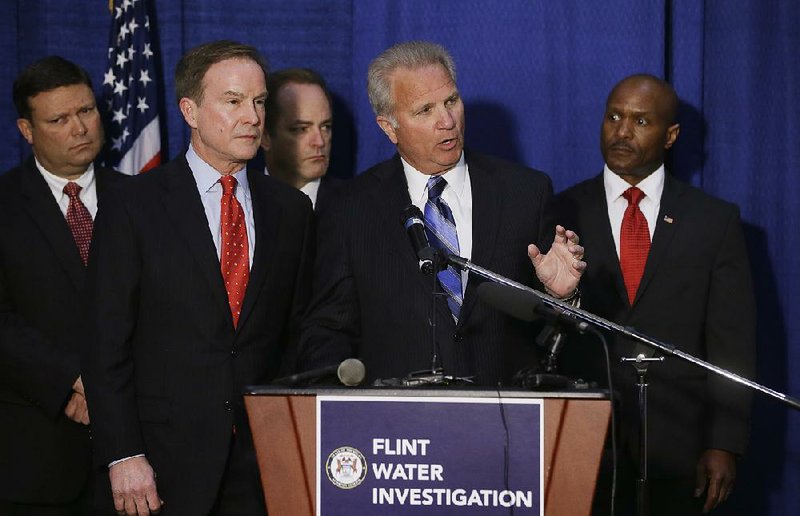FLINT, Mich. -- The water crisis in Flint became a criminal case Wednesday when two state regulators and a city employee were charged with official misconduct, evidence-tampering and other offenses over the lead-contamination disaster.
"This is a road back to restoring faith and confidence in all Michigan families in their government," state Attorney General Bill Schuette said in announcing the first charges to come out of the disaster, blamed on a series of bad decisions by bureaucrats and political leaders.
"These charges are only the beginning, and there will be more to come," Schuette said. "That I can guarantee you."
He added: "No one is off the table."
For nearly 18 months, the poor, majority-black city of 100,000 used the Flint River for tap water as a way to save money -- a decision made by a state-appointed emergency manager -- while a new pipeline was under construction. But the water wasn't treated to control corrosion. As a result, lead was released from aging pipes and fixtures as water flowed into homes and businesses.
Gov. Rick Snyder didn't acknowledge the problem until last fall, when tests revealed high levels of lead in children, in whom the heavy metal can cause brain damage and behavioral problems.
The criminal charges filed Wednesday, which were authorized by a Genesee County district judge, include more than a dozen separate counts.
Michael Prysby, a state Department of Environmental Quality worker who was a district engineer at the time, and Stephen Busch, a supervisor in the department's drinking water office, were charged with misconduct, conspiracy, tampering with test results and misdemeanor violations of clean-water law. The felonies carry maximum penalties of four to five years in prison.
Prysby faces an additional felony charge of authorizing a permit for the Flint treatment plant, "knowing it would fail to provide clean and safe drinking water to families," Schuette said.
Among other things, they were accused of failing to order that anti-corrosion chemicals be added to the water to coat the pipes and prevent them from releasing lead.
Flint Utilities Administrator Michael Glasgow, who oversaw day-to-day operations at the city's water plant at the time, was charged Wednesday with tampering with evidence, accused of falsifying test results, and with willful neglect of duty.
Busch and Prysby pleaded innocent and were released on bond. Both were suspended without pay. Their attorneys did not immediately return calls seeking comment.
Glasgow also was placed on leave and awaited a court appearance. A telephone number for him could not be found, and it wasn't known whether he had a lawyer.
The charges come three months after Schuette announced that he would investigate the circumstances that led to Flint's water crisis to see whether laws were broken during what he called "a human tragedy."
"We have a long way to go. We have a lot of people to interview, a lot of evidence to get," said former Wayne County prosecutor Todd Flood, who is helping lead the investigation. "We're not targeting any person or people. But nobody is off limits, either."
The crisis -- and the state's slow response to complaints about the water from experts and residents -- led to allegations of racial discrimination, became an issue in the presidential race before Michigan's Democratic primary in March, and sent other U.S. cities rushing to test their water, particularly in older neighborhoods with lead pipes.
"They failed Michigan families. Indeed, they failed us all," Schuette said of the three men charged. "I don't care where you live."
Snyder not questioned
Investigators were asked repeatedly Wednesday whether they were investigating Snyder or other top state officials. They said only that they will follow the facts of the case wherever they lead, no matter the outcome.
Snyder, a Republican, said Wednesday afternoon that he has not been questioned or interviewed as part of Schuette's investigation, though he said his office has been cooperating with the inquiry. Asked whether he felt he did anything criminally wrong, Snyder answered: "I don't even want to get into that kind of speculation. I don't believe so."
A task force appointed by Snyder to investigate the water-contamination crisis in Flint issued a report last month that largely blamed state officials in what it called "a story of government failure, intransigence, unpreparedness, delay, inaction and environmental injustice." It detailed a widespread lack of responsibility and leadership behind the catastrophe, which exposed more than 95,000 residents in the city -- including about 9,000 children younger than 6 -- to water tainted with lead.
The task force faulted a wide range of officials in its report. It said the Environmental Quality Department "failed in its fundamental responsibility" to enforce drinking-water regulations and assured the governor's office that Flint's water was safe when it wasn't.
The report also said Snyder and his administration failed to act even after "suggestions to do so by senior staff members in the Governor's office." In addition, the task force said the Flint Water Department "rushed unprepared" into switching to a new water source in spring 2014 without proper use of corrosion controls. It also blamed the U.S. Environmental Protection Agency's delayed enforcement of federal drinking-water standards for "prolonging the calamity."
Outside experts have suggested a link between the river and a deadly Legionnaires' disease outbreak. There were at least 91 cases and 12 deaths across Genesee County, of which Flint is the county seat, during a 17-month period. That represents a fivefold increase over what the county averaged before.
After the crisis broke open, Environmental Quality Department Director Dan Wyant and his spokesman resigned. The chief of the department's drinking-water office was fired. And the director of the EPA's Midwest office in Chicago stepped down.
A first step
"It's a good first step, but it's a small step," Flint resident Melissa Mays said of the criminal charges filed Wednesday. "These are lower-level people, and I want to know who was instructing them to do what they did. I think it's important that we can see some form of accountability being laid out, but at the end of the day we still can't drink or bathe in our water safely."
Resident William Chatman, 61, was at Bible study in a Flint church, where he has helped distribute water, when the charges were announced.
"It's a victory," Chatman said. "Those people that ... allowed it to happen, you have to pay the consequences for your actions. This sends a signal out to others. You need to take your job seriously and do the right thing." He said he hopes investigators don't stop until they've dug even deeper into any misconduct that contributed to the city's water problems. "If they have to go to the top, that's what they should do," Chatman said.
For months, people in Flint have been relying on filters and bottled water. Some still do not trust what comes out of their faucets, even though the city rejoined the Detroit-area water system last fall and anti-corrosive phosphates are being added.
Researchers from Virginia Tech University reported last week that Flint's water system is in much better shape. "The system is definitely on its path to recovery," Marc Edwards, the Virginia Tech professor whose work helped bring Flint's water crisis to light, said at the time.
The governor filled a few jugs of filtered Flint tap water this week and pledged to drink it for 30 days to show it's safe.
During a round of tests last month, a lower percentage of homes showed high lead levels, and even in those where levels still exceed federal standards, the amount of lead appears to be falling, the researchers said.
The corrosion-control efforts also appear to be reducing levels of iron in the water. But the researchers found that too many homes still had lead levels above the federal "action level" of 15 parts per billion. In addition, they said, lead levels throughout Flint's water system are "highly variable."
"Thus, virtually all homes in Flint must be considered at risk, at the present time, for elevated lead in water," researchers wrote in a summary of their findings, "unless the homeowner is certain that there is no lead plumbing ... in the home."
Most U.S. cities stopped installing lead pipes in the 1930s to carry water from main lines under the streets and into homes. But a survey by the American Water Works Association found that 6.5 million of the pipes are still in use.
Some researchers question whether chemical treatment and routine testing for lead in the water are enough, arguing that the only way to remove the threat is to replace the plumbing. But the cost could be huge.
Michigan lawmakers are considering legislation to give Flint an emergency $25 million to replace thousands of lead pipes.
Information for this article was contributed by Mike Householder, Ed White and David Eggert of The Associated Press and by Brady Dennis and Mark Berman of The Washington Post.
A Section on 04/21/2016




